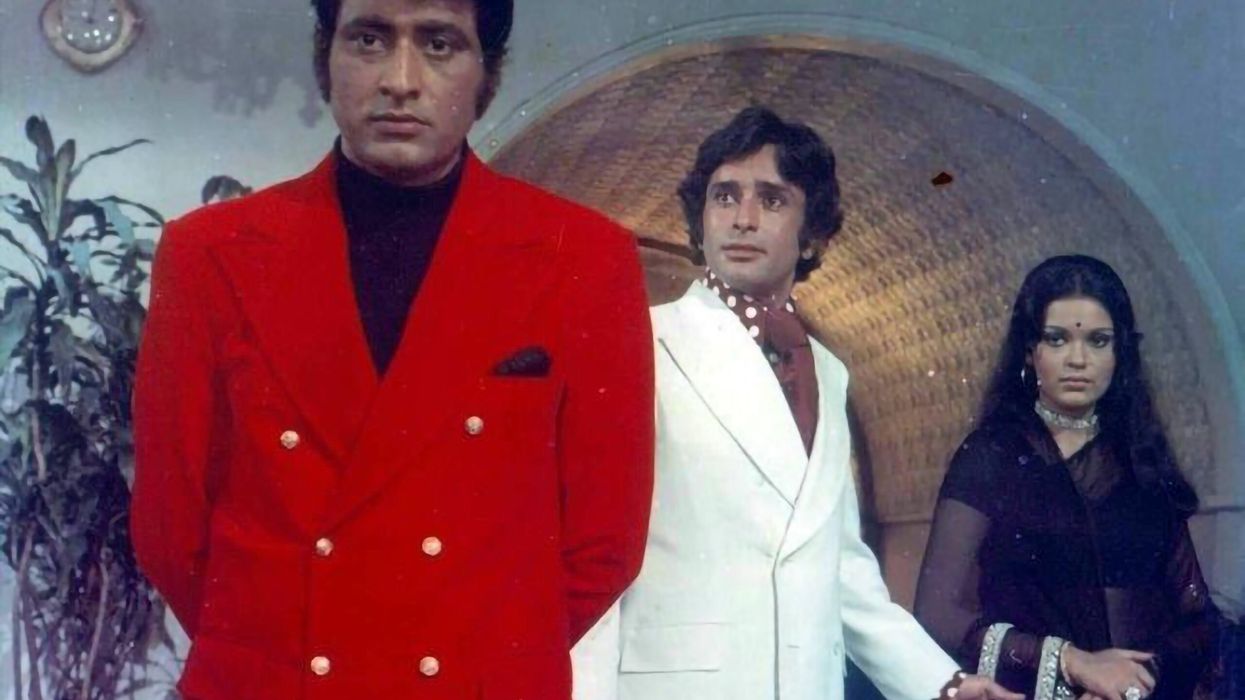WHEN Roti Kapada Aur Makaan was released in cinemas on October 18, 1974, it strongly resonated with audiences and became the highest-grossing film of the year.
This all-time classic, written, produced, directed, and headlined by movie star Manoj Kumar, transcended conventional storytelling, delivering powerful social commentary on the struggles of the common man. Powered by a strong cast, this social drama about essential human needs explored themes of dignity, survival, economic disparity, and life in a turbulent era.
Eastern Eye decided to celebrate the drama’s golden anniversary by sharing fascinating facts connected to it:
Manoj Kumar visited several unemployment offices and interacted with job seekers to authentically portray his role. He also drew on his early job-hunting struggles for inspiration, with scenes where his character searches for a job reflecting these real-life observations.
Rajesh Khanna was initially considered for the role of Mohan Babu but had to decline due to other commitments. Navin Nischol, approached next, opted out, not wanting to act in a multistarrer. Although Rajendra Kumar was offered the role, he requested improvements that Manoj Kumar declined to make. Shashi Kapoor was ultimately cast, earning great acclaim.
Sharmila Tagore was first offered the role of Sheetal, but she preferred the character played by Moushumi Chatterjee. Kumar, however, ultimately cast Zeenat Aman as Sheetal.
Zeenat Aman initially hesitated to play the morally ambiguous role of a woman leaving her struggling partner for a wealthier man but was eventually persuaded, solidifying her status as a leading lady willing to break norms.
Amitabh Bachchan was relatively unknown when he was cast in the film but had become a star by its release. His presence helped it become a blockbuster. Despite a suddenly packed schedule, Bachchan made special efforts to accommodate the film, shooting some of his most intense scenes between other projects.
Manoj Kumar had offered Smita Patil a role when she was still an unknown, which she declined. Patil would later become one of India’s greatest film actresses.
It was widely reported that Mehmood had been promised a role that did not materialise, leading to public expressions of displeasure by the legendary actor.
Legendary playback singer Mukesh, despite being unwell, completed the popular song Main Na Bhoolunga with Lata Mangeshkar.
Bachchan sustained an injury during an action sequence but continued shooting to avoid disrupting the schedule.
Chatterjee, pregnant during filming, could not shoot for the song Haye Haye Yeh Majboori. The song was shot with Zeenat Aman, though it didn’t suit her character’s story arc. Chatterjee later revealed that Kumar never fully forgave her for her inability to perform in that song.
During the filming of a rape scene, a significant amount of cooking flour fell on Chatterjee. A lot of it went into her mouth, leading to her vomiting the entire night. It also took hours to remove the flour from her hair.
In keeping with his patriotic Bharat persona, Manoj Kumar included no physical romantic scenes with Zeenat Aman in their roles.
This was the first film for which actor Ajay Devgn’s father, legendary stunt director Veeru Devgan, took full charge of the action scenes.
The project was Manoj Kumar’s most ambitious to date, leading him to mortgage his house to fund the film, which became that year’s biggest Bollywood success.
The film employed a lot of symbolism to reflect the socio-political climate of India at the time. Lead characters Bharat (Manoj Kumar) and Vijay (Amitabh Bachchan) symbolised India and victory, respectively, representing hope for a better future amidst struggles.
Indian cultural references were deliberately included in the dialogues to enhance resonance with the audience.
Kumar had filmed an alternate ending in which his character, Bharat, succumbs to life’s pressures and dies. He eventually chose a positive ending to convey a message of resilience and hope.
The initial cut of Roti Kapada Aur Makaan was much longer than the final 160-minute version, with Kumar editing out scenes to keep the narrative focused and concise.
Unused sub-plots that were excluded from the final edit involved a more in-depth exploration of the relationship between Bharat and his younger brother Vijay.
Kumar organised screenings for workers and lower-income groups to gauge the film’s impact on its target audience.
The film’s distributors and many Bollywood insiders initially disliked the title Roti Kapada Aur Makaan, but Kumar maintained it to encapsulate the film’s social message.
Following the film’s success, Kumar organised special screenings for the impoverished in various rural areas and held charity screenings, with proceeds donated to local initiatives aimed at alleviating poverty. This ultimately reflected the film’s core message.
Some sets used in Roti Kapada Aur Makaan were repurposed for other films of the time.
The song Hai Hai Yeh Majboori was later sampled by hip-hop artist Bubba Sparxxx in the song Ugly and remixed by Bally Sagoo on his album Bollywood Flashback 2.
Roti Kapada Aur Makaan was later remade in Telugu as Jeevana Poratam (1986) and continues to inspire Bollywood movies with its themes.
The timeless classic remains relevant today, highlighting the struggles of the poor and working class to secure basic necessities such as food, clothing, and shelter, as the title suggests. Many filmmakers have been inspired by its themes to create movies about the common man’s struggles, using it as a reference point for addressing similar social issues in subsequent decades.




